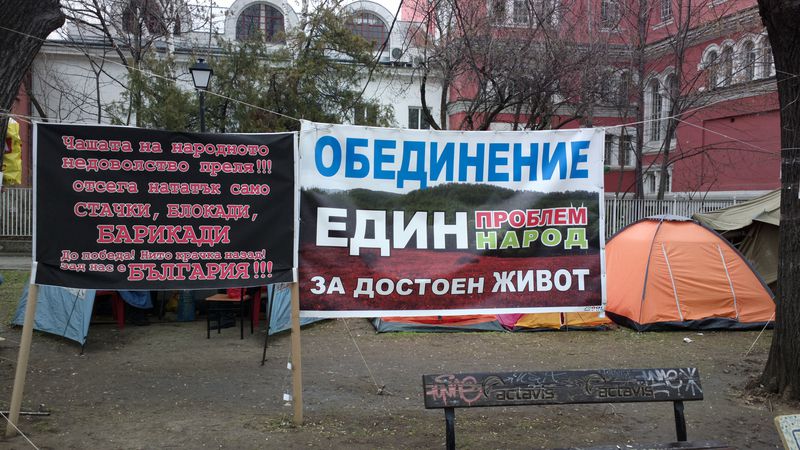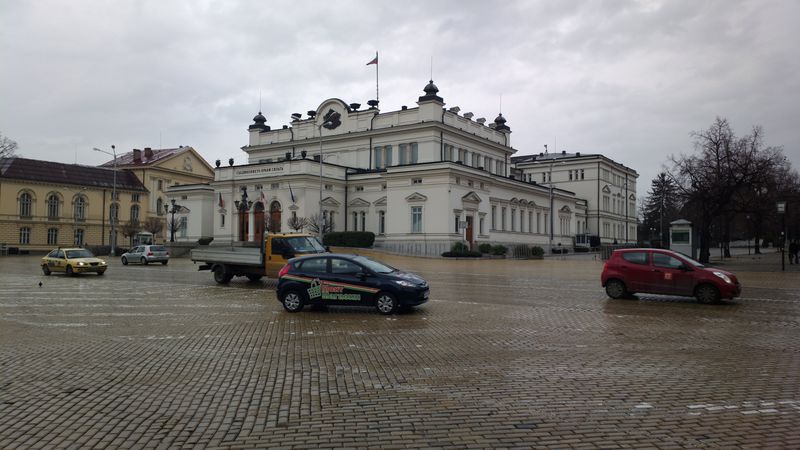Vladimir Shopov: Bulgarians Are Unable To Generate a Vision for Their Future
Adelina Marini, April 4, 2013
 2012 ended with protests in a small, northern Balkan country - Slovenia that evolved into a rebellion against the system. And 2013 marked the beginning of a series of protests in Bulgaria where everything seemed as if frozen forever in its inaction and lack of perspective. Hungary into the new year, too, continued to scare with a return to authoritarianism. Do all these developments have a common denominator and can we expect more countries from the former communist block to crash under the efforts to reproduce in a very short period of time the western democracy and economic culture that was built in centuries? With these questions I turned to two analysts in Bulgaria - Dimitar Bechev, head of the Sofia office of the ECFR (you can watch the interview here) and Vladimir Shopov, a political analyst, with whom the interview follows below:
2012 ended with protests in a small, northern Balkan country - Slovenia that evolved into a rebellion against the system. And 2013 marked the beginning of a series of protests in Bulgaria where everything seemed as if frozen forever in its inaction and lack of perspective. Hungary into the new year, too, continued to scare with a return to authoritarianism. Do all these developments have a common denominator and can we expect more countries from the former communist block to crash under the efforts to reproduce in a very short period of time the western democracy and economic culture that was built in centuries? With these questions I turned to two analysts in Bulgaria - Dimitar Bechev, head of the Sofia office of the ECFR (you can watch the interview here) and Vladimir Shopov, a political analyst, with whom the interview follows below:
euinside: What is the root of the political crisis? It was perceived in a quite controversial way, especially abroad?
Vladimir Shopov: This is the crisis of an incredible phenomenon - the political system in which no one deals with governance. Everyone are just acting directors. A public system which does not generate public goods. Something like a "black box" in which resource is poured and hope, but which disappoints every time. How can we name something that has been incapable for 20 years to decide where to situate the ambulances in a big city, which cannot and does not want to tackle childish governance cases? All this, garnished with primitive, arrogant attitude of an "elite" that "their people is in their hands", that they can stay in power without doing anything for that people. This is what the people's shouts are aimed at.
The second big reason is the irreversible declassifying of many big groups. They neither can find a place for themselves in this world nor can one of the available recipes bring them what they want. In a moment, the narrative about a possible future has ended. We read those we had at our disposal: the transition, joining the "rich club", etc. But then there is nothing after and we ourselves are incapable to generate a vision for our own future. And this is the essence of the current drama. But let us recall that the entire post-communist story was not the first and natural choice of a majority of Bulgarians. The big decision in the first elections in 1990 was an attempt to outwit history, to pull prosperity to yourselves without having earned it. And then the phony credit boom turned a similar attitude for the world into a norm, a new form of outwitting history. Now and after this game, there indeed is nothing to be seen as a new opportunity. Of course, other things are seen from outside.
euinside: Have the lessons from the transition been learnt?
Vladimir Shopov: We are not a society that is capable of collectively debating and summarising. We do not have the historic reflex to do that, we lack the culture of such an effort and therefore the infrastructure for it. Our collective experience is marked by failures, catastrophes, crashes. They trace our view back to history and define the size of our present. There is no way we could have learnt the lessons of the transition unless we do that with communism. But in order for me to be as honest as possible, this transition did not predispose for a lot of reflection too. From the very beginning, it was thought and done as a return, as a turn to obvious recipes for success, prosperity and democracy. As an opportunity to apply the recipe book of the well tested formulae for a good future. This was institutionalised in various ways and thus the need to learn dropped off. But this world has fallen apart and now we are especially incapable to understand what is happening to us and even less what should we do. We are also destroying the institutions with which we could have possible tried to.
euinside: The governance of former Prime Minister Boyko Borissov was associated, among other things, with authoritarian rule of the kind we see in Hungary. Is there anything in common between the processes that are unfolding in the two countries? In Slovenia, too, there is a severe political crisis which seems to be based on something else - the protests there started from corruption, but is it possible in the three countries the problems to have common roots - for instance a failed transition, a transition that never took place or else?
Vladimir Shopov: Corruption is the name of the never ending original sin which everyone are forced to observe. The birth, or more likely the formalisation and deepening of inequality, is the big trauma and wound in our region and it does not stop bleeding because it is still before our eyes. This pain and a sense of injustice cannot be compensated even by partial consumer joys. Secondly, it appeared that in the expected catch-up with the West there is no automatism in spite of the promises of the last decades. An accession, yes, but everything resembles more and more an endless running without any guarantee. I already see another reason, too, for the woes of our regional regimes. While we were doing our transition toward market and democracy, many of the western states were doing their transition toward globalisation and those are not the same things.
And again we are as if lost in a new world for which again we are not prepared. Nevertheless, we have to look at other possible explanations. Note that countries like Slovakia, the Czech Republic and Poland have shown a higher governance culture and have created more sustainable new economies that assume the people's expectations - the re-industrialisation of the Slovaks, the integrated market of the Czechs or the dynamic Polish economy which is succeeding in combining the creation of a relatively big internal market and export capacity as well.
euinside: Can we expect that in other former totalitarian countries similar problems to blossom?
Vladimir Shopov: If the above analysis is correct, more or less we know where we could expect continuous perturbations. But no one can be sure in their forecasts because we, indeed, are in a new situation and many of the elites simply are not sure what to do and how to rule.
euinside: What impact will all these processes have on enlargement?
Vladimir Shopov: Practically, all foundations of enlargement are shaken. From the point of view of the old member states, the added value from it is in general depleted, only the extent of potentially harmful impact is being considered from the remained region in the south-east. It is not quite needed as market, firstly because it is already conquered and mostly because everyone now is looking at Asia not at the poor south-eastern periphery. The historic stakes of enlargement have disappeared, it is already consumed, the EU wrote this story of its yet in 2004. The big test for the Union is its global positioning and it is where the political energy is aimed at. Enlargement is not simply an unfinished business, it is not urgent anymore. Besides, everyone know that the magic of legislative and institutional transfer is not a guarantee for an irreversible change.
point of view of the old member states, the added value from it is in general depleted, only the extent of potentially harmful impact is being considered from the remained region in the south-east. It is not quite needed as market, firstly because it is already conquered and mostly because everyone now is looking at Asia not at the poor south-eastern periphery. The historic stakes of enlargement have disappeared, it is already consumed, the EU wrote this story of its yet in 2004. The big test for the Union is its global positioning and it is where the political energy is aimed at. Enlargement is not simply an unfinished business, it is not urgent anymore. Besides, everyone know that the magic of legislative and institutional transfer is not a guarantee for an irreversible change.
Regress is not only a possibility, it is an expectation and this is why the entire time framework of the undertaking is being changed - a deep change will be taking place in societies before they become part of the Union. Moreover, the deepening of the integration at the moment brings the thought that every new member is a potential Cyprus or Slovakia which decided to block one of the rescue packages for Greece. In other words, the addition of new countries no longer is perceived as a geopolitical or economic bonus, but as a boring commitment which has to some day become a reality.
euinside: In the EU are taking place debates, although only at academic level, for continuation of integration into a political union. What are your expectations, how bold can the next steps be?
Vladimir Shopov: What the Union is getting for sure is an accelerated politicisation of integration, meaning its turning into a hot topic which not simply is involving societies in debates, but is restructuring the political system (The Netherlands, Finland, Britain, Austria). This is the first step before any constructs of theory. Without such an analysis of the developments in general we cannot legitimately reach to the very conversation about a political union and from such a point of view, there is no sense to discuss the very architecture of the undertaking now. This is a difficult path and it will bring rather problems and dilemmas, but the next integrational step will not be stable without higher legitimacy from the perspective of voters. For this reason, suddenly most societies in Europe found themselves in new debates in that sense about the process, the benefits, the goals, the costs, etc. If this ends successfully, on the other side is the issue of the political union, but it is not on the table except only in terms of a rhetoric reference for momentary decisions.
euinside: Is it possible that there is a certain restraint at the moment not only because of the economic woes in the peripheral countries, but also because of the political problems in the former communist countries? The European leaders and political parties are aiming high for very different elections for the European Parliament in 2014. Sometimes everything sounds as if the leaders of the EU institutions live in their own world. Do you expect these elections to be more different than usual?
 Vladimir Shopov: These elections will be very interesting because they will, indeed, be the first in the real context of this politicisation of the question about Europe. Everyone have reasons to be dissatisfied and if we add to that the habit of such a type of "second row" to vote to punish, the picture can prove quite dim. But we have to go through such a process. We need a new debate about the meaning of the project, but I don't know how will the European elites be capable to speak with the voters. They do not have this new language which is necessary, only the exhausted theses of political correctness for Europe. The clash will be very interesting. As we know, there will be innovations - early nominations of the europarties for a chief of the Commission. But imagine how does a conversation sound between a EPP candidate from a Nordic country with the citizens of Greece or Spain! That vote will be an entry point for this big debate which, however, will take place on national level. I do not see how can this be otherwise, at least at this stage.
Vladimir Shopov: These elections will be very interesting because they will, indeed, be the first in the real context of this politicisation of the question about Europe. Everyone have reasons to be dissatisfied and if we add to that the habit of such a type of "second row" to vote to punish, the picture can prove quite dim. But we have to go through such a process. We need a new debate about the meaning of the project, but I don't know how will the European elites be capable to speak with the voters. They do not have this new language which is necessary, only the exhausted theses of political correctness for Europe. The clash will be very interesting. As we know, there will be innovations - early nominations of the europarties for a chief of the Commission. But imagine how does a conversation sound between a EPP candidate from a Nordic country with the citizens of Greece or Spain! That vote will be an entry point for this big debate which, however, will take place on national level. I do not see how can this be otherwise, at least at this stage.
euinside: British Prime Minister David Cameron spoke earlier this year of the lack of a European demos, but from the preparation of the European political parties and institutions it seems that this does not scare them a lot. Is the European demos the problem in the EU at the moment or that the member states are so different both politically, economically, in their mentalities, culturally?
Vladimir Shopov: This is an important topic because diversity remains a cultural value, but the crisis is being solved by ever more aggressively imposing a model of economic development, a group of presumptions about how to do things in the economy. This will be a test for the Union because diversity is not simply drawn as some abstract ethical category which we line up in front. It is reality and it is intertwined in the idea of equality. There is no hierarchy of the perceptions about the order in society, in other words the EU does not have universal order everyone to apply. This is the deep understanding about equality between nations which goes beyond the formal reciprocity and this is what makes this organisation unique.
But for now, this idea is besieged. There is institutionalisation taking place of one group of perceptions for the sake of another (austerity, export economy, broader industrial base, control over domestic demand, etc). This can be the "right" decision, but it puts in a footnote diversity and its value. The problem is how can the Union be enhanced and in the same time not lose one of its deepest natures without depriving itself of legitimacy in the eyes of the Europeans. This is the big riddle.
 Federica Mogherini | © Council of the EU
Federica Mogherini | © Council of the EU | © Council of the EU
| © Council of the EU Luis De Guindos | © Council of the EU
Luis De Guindos | © Council of the EU